


Books in series

In Denial
Quarterly Essay 1
2001

Appeasing Jakarta
Australia's Complicity in the East Timor Tragedy
2001

The Opportunist
John Howard and the Triumph of Reaction
2001

Rabbit Syndrome
Australia and America
2001

Girt By Sea
Australia, the Refugees and the Politics of Fear
2002

Beyond Belief
What Future for Labor?
2002

Paradise Betrayed
West Papua's Struggle for Independence
2002

Groundswell
The Rise of the Greens
2002

Beautiful Lies
Population and Environment In Australia
2003

Bad Company
The Cult of the CEO
2003

Whitefella Jump Up
The Shortest Way to Nationhood
2003

Made in England
Australia's British Inheritance
2003

Sending Them Home
Refugees and the New Politics of Indifference
2003

Mission Impossible
The Sheikhs, the U.S. and the Future of Iraq
2004

Latham's World
The New Politics of the Outsiders
2004

Breach of Trust
Truth, Morality and Politics
2004

'Kangaroo Court'
Family Law in Australia
2005

The Worried Well
The Depression Epidemic and the Medicalisation of our Sorrows
2005

Relaxed & Comfortable
The Liberal Party's Australia
2005

A Time for War
Australia as a Military Power
2005

What's Left?
The Death of Social Democracy
2006

Voting for Jesus
Christianity and Politics in Australia
2006

The History Question
Who Owns the Past?
2006

No Fixed Address
2006

Bipolar Nation
How to Win the 2007 Election
2007

His Master's Voice
The Corruption of Public Debate Under Howard
2007

Reaction Time
Climate Change and the Nuclear Option
2007

Exit Right
The Unravelling of John Howard
2007

Love & Money
The Family and the Free Market
2008

Quarterly Essay
Last Drinks
2008

Now or Never
A Sustainable Future for Australia?
2008

American Revolution
The Fall of Wall Street and the Rise of Barack Obama
2008

Quarry Vision
2009

Stop at Nothing
The Life and Adventures of Malcolm Turnbull
2009

Radical Hope
Education and Equality in Australia
2009

Australian Story
Kevin Rudd and the Lucky Country
2009

What's Right?
The Future of Conservatism in Australia
2010

Power Trip
The Political Journey of Kevin Rudd
2010

Power Shift
2010

QE40
Trivial Persuit
2010

The Happy Life
The Search for Contentment in the Modern World
2011

Quarterly Essay 42 Fair Share
Country and City in Australia
2011

Bad News
Murdoch's Australian and the Shaping of the Nation
2011

Man-Made World
Choosing Between Progress and Planet
2011

Quarterly Essay 45 Us and Them
On the Importance of Animals
2012

Great Expectations
Government, Entitlement and an Angry Nation
2012

Political Animal
The Making of Tony Abbott
2012

Quarterly Essay 48 After the Future
Australia's New Extinction Crisis
2012

Not Dead Yet
Labor's Post-Left Future
2013

Unfinished Business
Sex, Freedom and Misogyny
2013

The Prince
Faith, Abuse and George Pell
2013

Found in Translation
In Praise of a Plural World
2013

That Sinking Feeling
Asylum Seekers and the Search for the Indonesian Solution
2014

Dragon's Tail
The Lucky Country after the China Boom
2014

A Rightful Place
A Road Map to Recognition
2014

Clivosaurus
The Politics of Clive Palmer
2014

Dear Life
On Caring for the Elderly
2015

Blood Year
Terror and the Islamic State
2015

Quarterly Essay 59 Faction Man
Bill Shorten's Path to Power
2015

Political Amnesia
How We Forgot How to Govern
2015

Balancing Act
Australia Between Recession and Renewal
2016

Firing Line
Australia's Path to War
2016
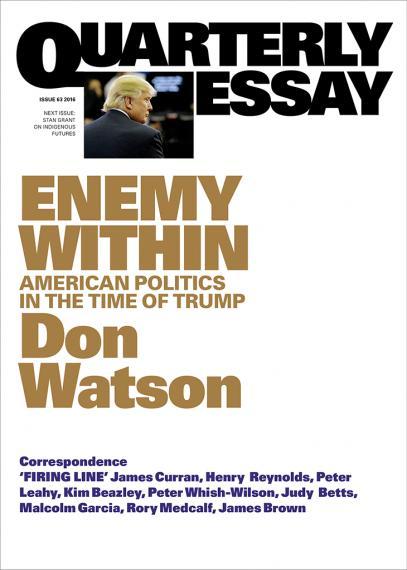
Enemy Within
American Politics in the Time of Trump
2016

The Australian Dream
Blood, History and Becoming
2016

The White Queen
One Nation and the Politics of Race
2017

The Long Goodbye
Coal, Coral and Australia's Climate Deadlock
2017

Moral Panic 101
Equality, Acceptance and the Safe Schools Scandal
2017

Without America
Australia in the New Asia
2017

Moment of Truth
History and Australia's Future
2018

Dead Right
How Neoliberalism Ate Itself and What Comes Next
2018

Follow the Leader
2018

Net Loss
The Inner Life in the Digital Age
2018

Australia Fair
2019

The Prosperity Gospel
How Scott Morrison Won and Bill Shorten Lost
2019

Men at Work
Australia's Parenthood Trap
2019

Red Flag
Waking Up to China's Challenge
2019

Cry Me a River
The Tragedy of the Murray Darling Basin
2020

The Coal Curse
Resources, Climate and Australia's Future
2020

The End of Certainty
Scott Morrison and Pandemic Politics
2020

The High Road
What Australia can learn from New Zealand
2020

Getting to Zero
Australia's Energy Transition
2021

Exit Strategy
2021
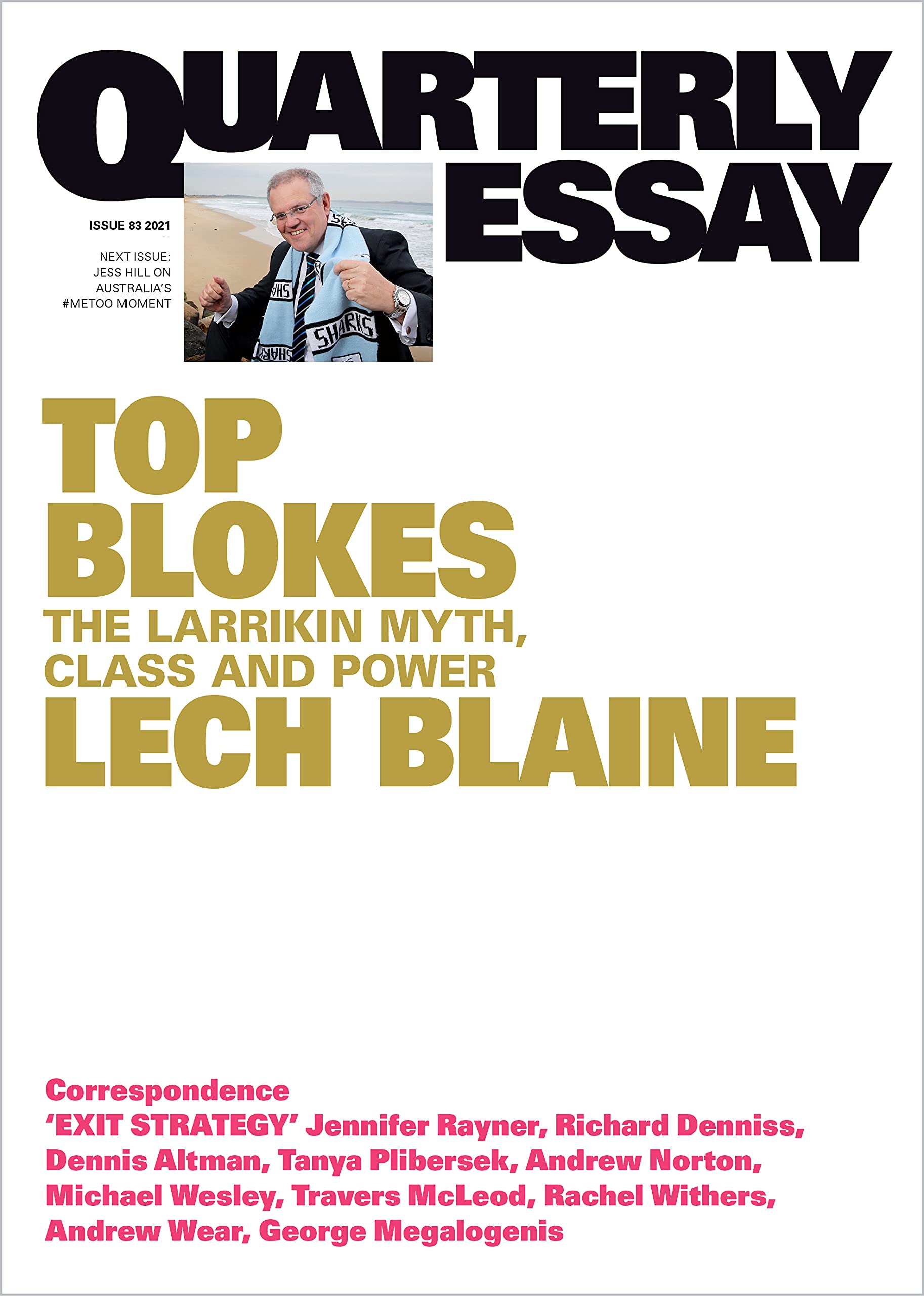
Top Blokes
The Larrikin Myth, Class and Power
2021

The Reckoning
How #MeToo is Changing Australia
2021

Not Waving, Drowning
Mental Illness and Vulnerability in Australia
2022
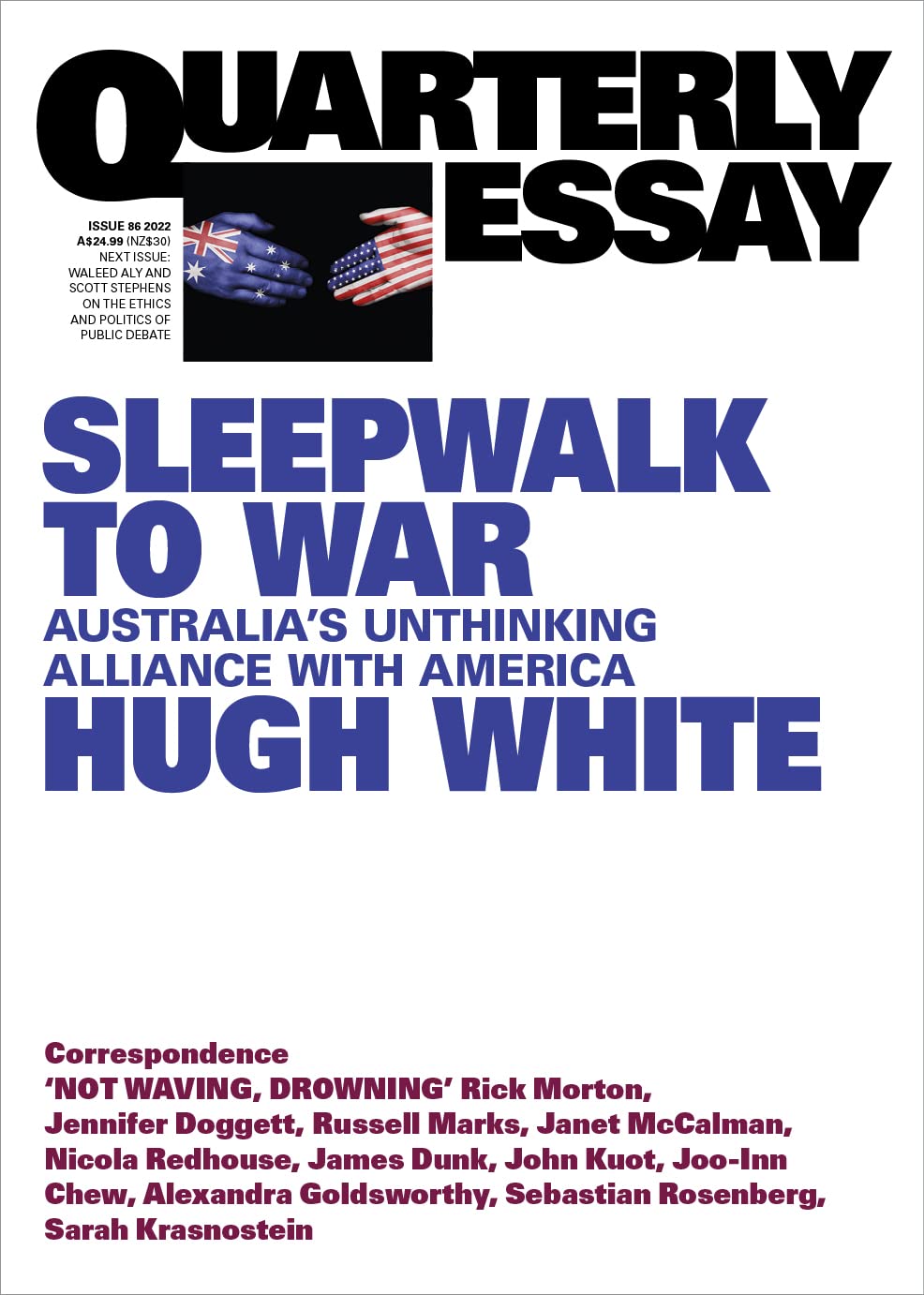
Sleepwalk to War
Australia’s Unthinking Alliance with America
2022

Uncivil Wars
How Contempt Is Corroding Democracy
2022

Lone Wolf
Albanese and the New Politics
2022

The Wires That Bind
Electrification and Community Renewal
2023

Voice of Reason
On Recognition and Renewal
2023
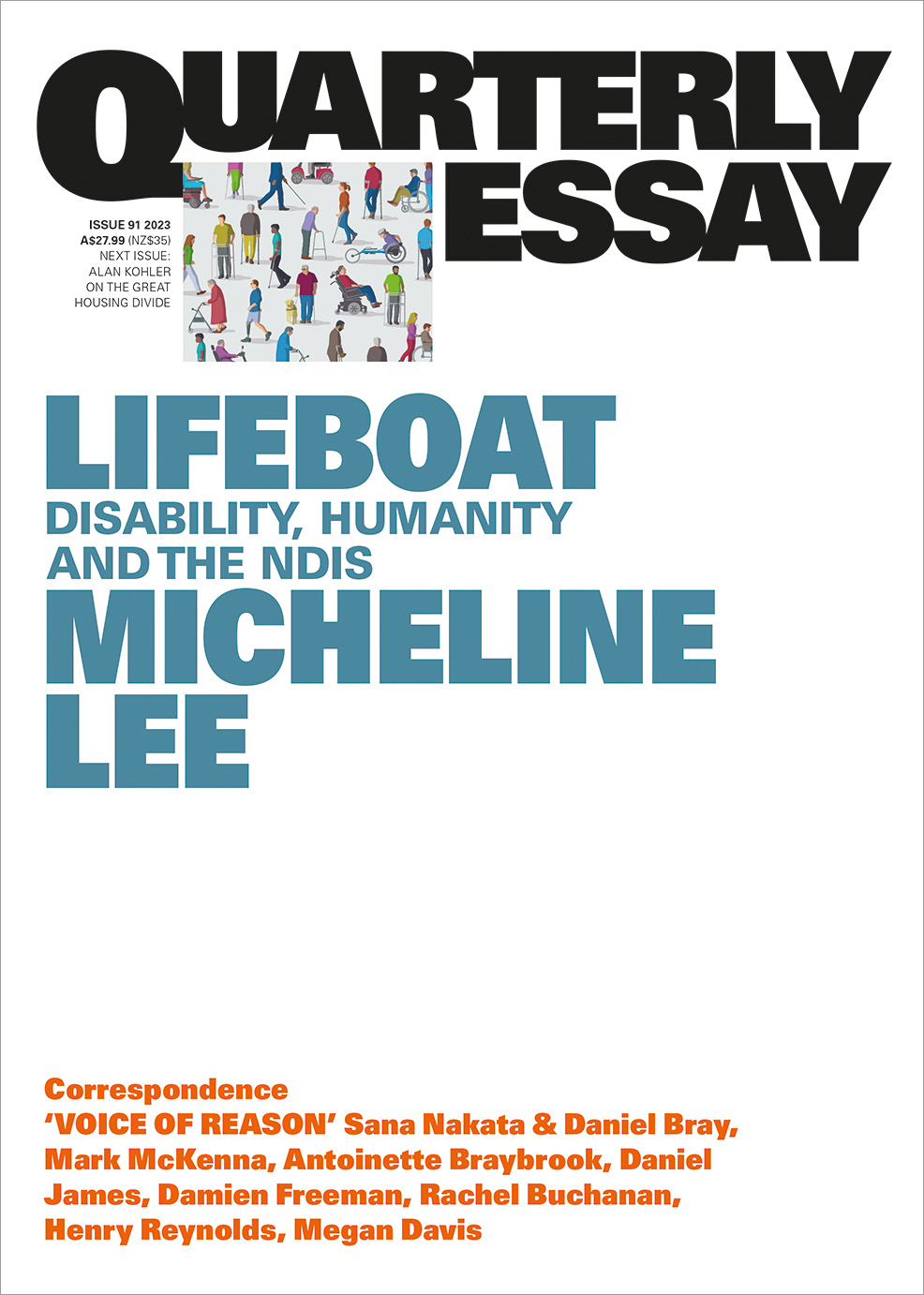
Lifeboat
Disability, Humanity and the NDIS
2023

The Great Divide
Australia's Housing Mess and How to Fix It
2023
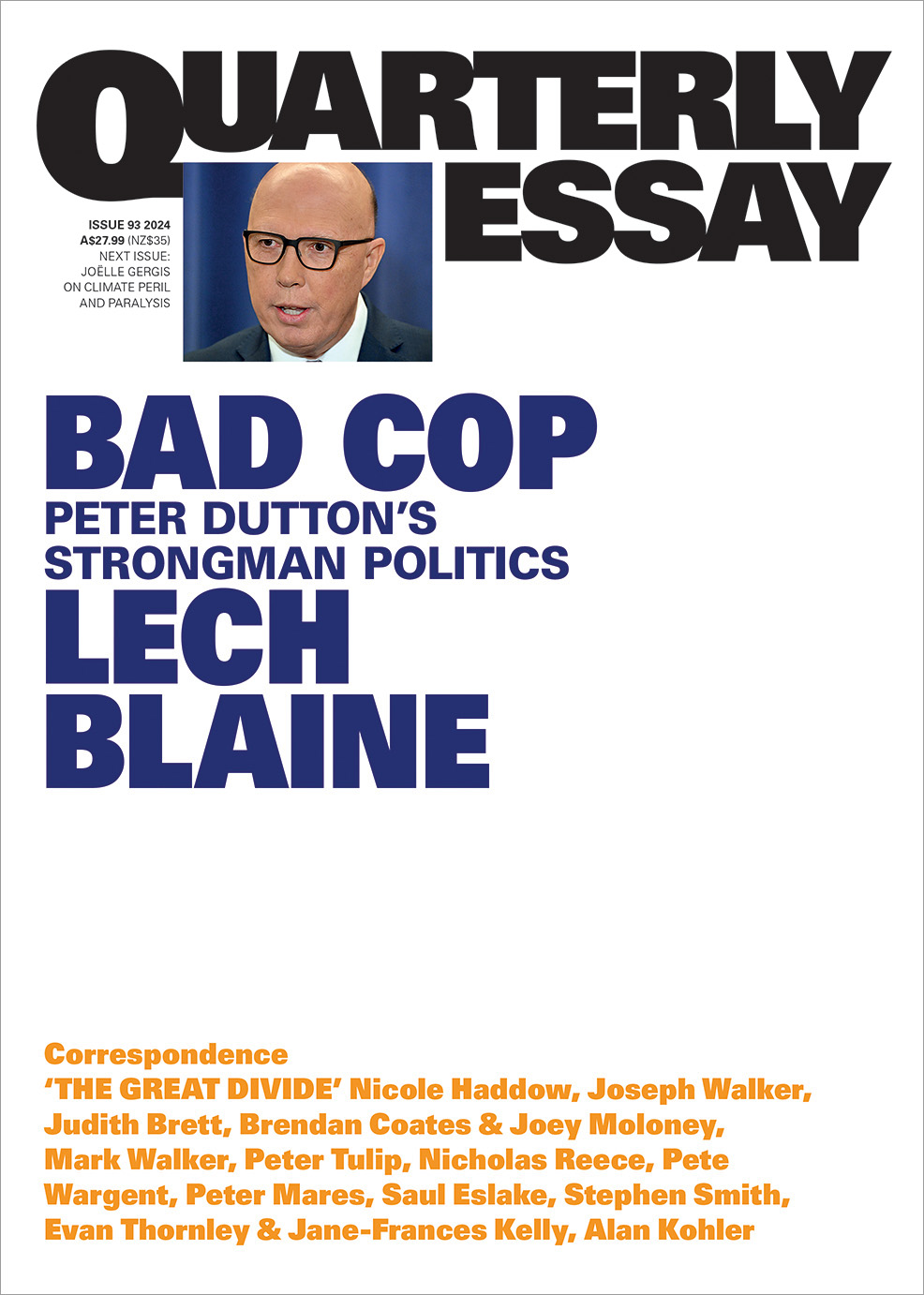
Bad Cop
Peter Dutton's Strongman Politics
2024
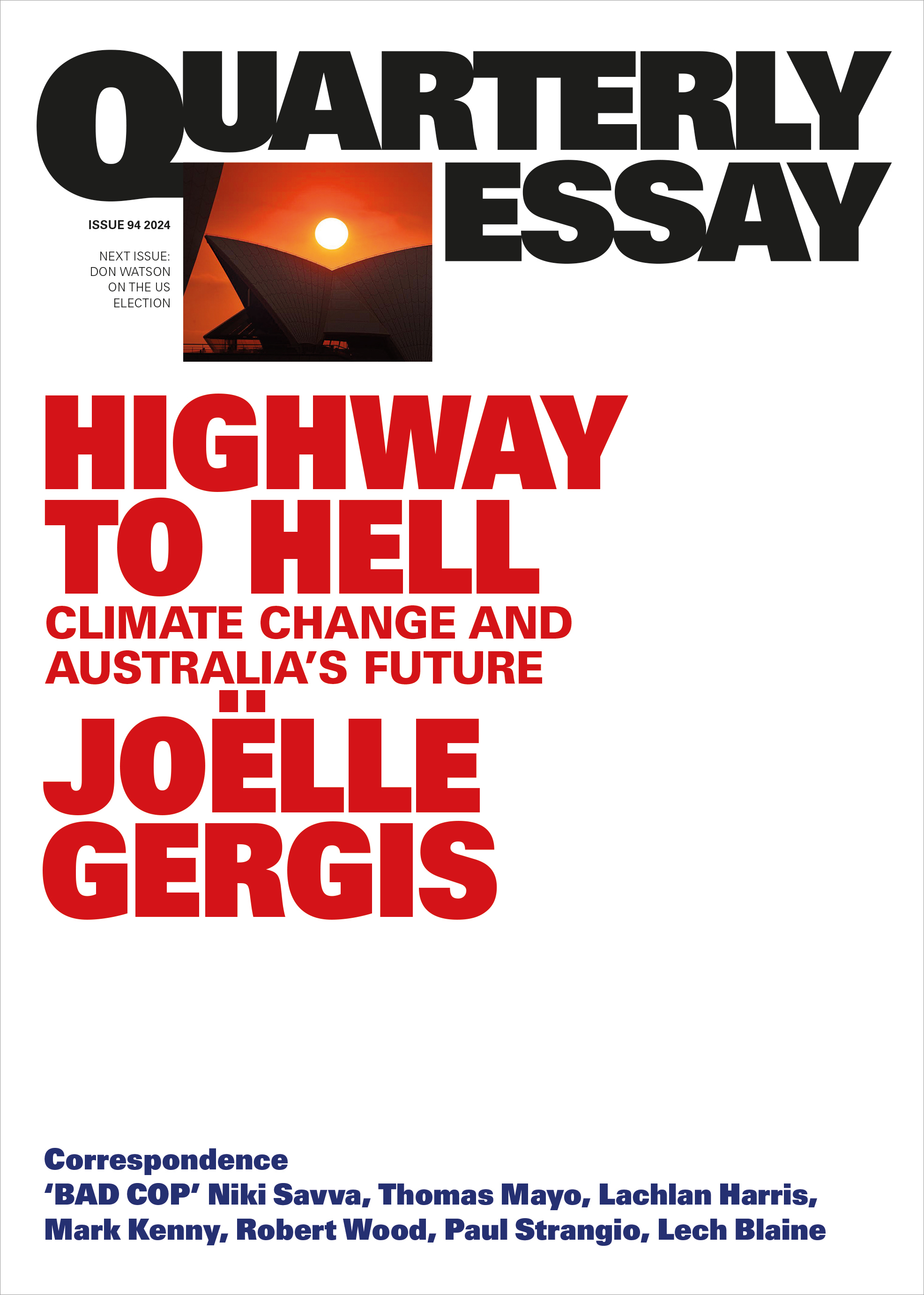
Highway to Hell
Climate Change and Australia's Future
2024

High Noon
Trump, Harris and America on the Brink
2024
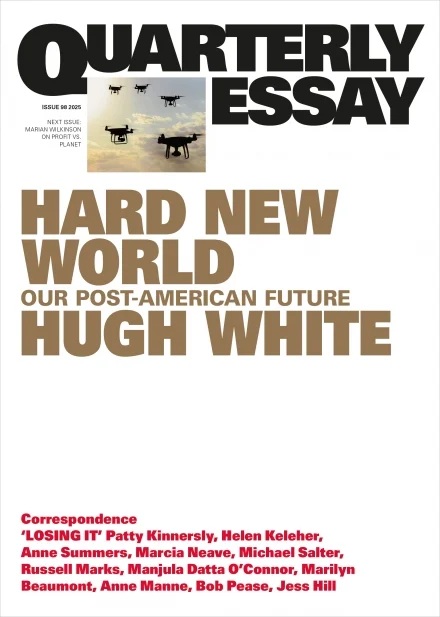
Hard New World
Our Post-American Future
2025
Authors

Tim Flannery is one of Australia's leading thinkers and writers. An internationally acclaimed scientist, explorer and conservationist, he has published more than 130 peer-reviewed scientific papers and many books. His books include the landmark works The Future Eaters and The Weather Makers, which has been translated into more than 20 languages and in 2006 won the NSW Premiers Literary Prizes for Best Critical Writing and Book of the Year. He received a Centenary of Federation Medal for his services to Australian science and in 2002 delivered the Australia Day address. In 2005 he was named Australian Humanist of the Year, and in 2007 honoured as Australian of the Year. He spent a year teaching at Harvard, and is a founding member of the Wentworth Group of Concerned Scientists, a director of the Australian Wildlife Conservancy, and the National Geographic Society's representative in Australasia. He serves on the board of WWF International (London and Gland) and on the sustainability advisory councils of Siemens (Munich) and Tata Power (Mumbai). In 2007 he co-founded and was appointed Chair of the Copenhagen Climate Council, a coalition of community, business, and political leaders who came together to confront climate change. Tim Flannery is currently Professor of Science at Maquarie University, Sydney.


Librarian Note: There is more than one author in the GoodReads database with this name. See this thread for more information. Eminent Australian journalist, author, and progressive political and social commentator. David Marr is the multi-award-winning author of Patrick White: A Life, Panic and The High Price of Heaven, and co- author with Marian Wilkinson of Dark Victory. He has written for the Sydney Morning Herald, the Age, The Saturday Paper, The Guardian Australia and the Monthly. He has been editor of the National Times, a reporter for Four Corners and presenter of ABC TV’s Media Watch. He is also the author of two previous bestselling biographical Quarterly Essays: Power Trip: The Political Journey of Kevin Rudd and Political Animal: The Making of Tony Abbott. His areas of expertise include Australian politics, law, censorship, the media and the arts. David Marr began his career in 1973 and is the recipient of four Walkley awards for journalism. He also appears as a semi-regular panellist on the ABC television programs Q&A and Insiders.
Anne Manne is a Melbourne writer. She has been a regular columnist for the Australian and the Age. More recently her essays on contemporary culture such as child abuse, pornography, gendercide and disability have all appeared in The Monthly magazine. Her essay ‘Ebony: The Girl in the Room’ was included in The Best Australian Essay’s: A Ten Year Collection. Her book, Motherhood: How should we care for our children, was a finalist in the Walkley Award for Best Non-Fiction Book of 2006. She has written a Quarterly Essay, ‘Love and Money: The family of the Free Market’ and a memoir, So this is Life: Scenes from a country childhood.
- Taken from The Life of I: The New Culture of Narcissism


Clive Hamilton AM FRSA is an Australian public intellectual and Professor of Public Ethics at the Centre for Applied Philosophy and Public Ethics and the Vice-Chancellor's Chair in Public Ethics at Charles Sturt University. He is a member of the Board of the Climate Change Authority of the Australian Government, and is the Founder and former Executive Director of The Australia Institute. He regularly appears in the Australian media and contributes to public policy debates. Hamilton was granted the award of Member of the Order of Australia on 8 June 2009 for "service to public debate and policy development, particularly in the fields of climate change, sustainability and societal trends". (From Wikipedia.)



Anna Krien is the author of Night Games: Sex, power and sport, which won the William Hill Sports Book of the Year Award, Into the Woods: The battle for Tasmania’s forests and Us and Them: On the importance of animals (Quarterly Essay 45). Anna’s work has been published in the Monthly, the Age, the Big Issue, The Best Australian Essays, Griffith REVIEW, Voiceworks, Going Down Swinging, Colors, Frankie and Dazed & Confused.




Watson grew up on a farm in Gippsland, took his undergraduate degree at La Trobe University and a Ph.D at Monash University and was for ten years an academic historian. He wrote three books on Australian history before turning his hand to TV and the stage. For several years he combined writing political satire for the actor Max Gillies with political speeches for the former Premier of Victoria, John Cain. In 1992 he became Prime Minister Paul Keating's speech-writer and adviser and his best-selling account of those years, Recollections of a Bleeding Heart': Paul Keating Prime Minister, won both the The Age Book of the Year and non-fiction Prizes, the Brisbane Courier Mail Book of the Year, the National Biography Award and the Australian Literary Studies Association's Book of the Year. In addition to regular books, articles and essays, in recent years he has also written feature films, including The Man Who Sued God, starring Billy Connolly and Judy Davis. His 2001 Quarterly Essay Rabbit Syndrome: Australia and America won the inaugural Alfred Deakin Prize in the Victorian Premier's Literary Awards. Death Sentence, his book about the decay of public language, was also a best seller and won the Australian Booksellers Association Book of the Year. Watson's Dictionary of Weasel Words was published in 2004 and continued to encourage readers to renounce what he perceives to be meaningless corporate and government jargon that is spreading throughout Australia and embrace meaningful, precise language. More recently Watson contributed the preface to a selection of Mark Twain's writings, The Wayward Tourist. His latest book, American Journeys is a narrative of modern America from Watson's travels in the United States following Hurricane Katrina. It was published by Knopf in 2008 and won both the The Age Book of the Year non-fiction and Book of the Year awards.[4]. It also won the 2008 Walkley Award for the best non-fiction book.
Mungo Wentworth MacCallum (21 December 1941 – 9 December 2020) was an Australian political journalist and commentator. From the 1970s to the 1990s he covered Australian federal politics from the Canberra Press Gallery for The Australian, The National Times, The Sydney Morning Herald, Nation Review and radio stations 2JJ / Triple J and 2SER. He wrote political commentary for the Australian Broadcasting Corporation (ABC) current affairs and news analysis program The Drum, frequently wrote for the magazine The Monthly, and contributed political commentary to Australia's national Community Radio Network, columns for the Byron Shire Echo and The Northern Star, and a weekly cryptic crossword for The Saturday Paper. He also authored several books, including Run, Johnny, Run, written after the 2004 Australian federal election. His autobiographical narrative of the Australian political scene, Mungo: the man who laughs – has been reprinted four times. How To Be A Megalomaniac or, Advice to a Young Politician was published in 2002, and Political Anecdotes was published in 2003. In December 2004, Duffy & Snellgrove published War and Pieces: John Howard's last election.


Margaret Simons (b 1960) is an Australian academic, freelance journalist and author. She is currently the media commentator for Crikey and has written ten books. She is currently Director of the Centre for Advanced Journalism at the Graduate School of Humanities and Social Sciences, the University of Melbourne. Simons was a finalist for a Walkley Award for journalism in 2007 for the story Buried in the Labyrinth, about the release of a pedophile into the community, published in Griffith Review and her book The Content Makers – Understanding the Future of the Australian Media was longlisted for the 2008 non-fiction book Walkley award. Simons also writes for The Age, the Sydney Morning Herald and The Monthly. For many years, she wrote the "Earthmother" gardening column for The Australian. Simons has a doctorate from the University of Technology, Sydney and was co-founder, with Melissa Sweet, of the community-funded news site YouComm News. She lives in Melbourne. (from Wikipedia https://en.wikipedia.org/wiki/Margare...)


John Birmingham grew up in Ipswich, Queensland and was educated at St Edmunds Christian Brother's College in Ipswich and the University of Queensland in Brisbane. His only stint of full time employment was as a researcher at the Defence Department. After this he returned to Queensland to study law but he did not complete his legal studies, choosing instead to pursue a career as a writer. He currently lives in Brisbane. While a law student he was one of the last people arrested under the state's Anti Street March legislation. Birmingham was convicted of displaying a sheet of paper with the words 'Free Speech' written on it in very small type. The local newspaper carried a photograph of him being frogmarched off to a waiting police paddy wagon. Birmingham has a degree in international relations.

Foreign Correspondent, Sydney Morning Herald Paul McGeough is an author and award-winning foreign correspondent specializing in frontline reporting. As Chief Correspondent for The Sydney Morning Herald, Australia's leading quality newspaper, McGeough has reported for the last eight years from the US, Iraq and Afghanistan on war and the change wrought in the world in the aftermath of the September 11 attacks which he witnessed in the streets of New York. Seventeen years ago McGeough was in Baghdad during the US bombing campaign in the First Gulf War. Most recently, he has reported from Afghanistan, Iraq and Lebanon during the post 9/11 wars in those countries; and from Pakistan, Iran, the Palestinian Occupied Territories and the US. In Afghanistan in 2001, McGeough survived a Taliban ambush in which three of his media colleagues were killed in the last days of the war. The Irish-born McGeough is a former managing editor of The Sydney Morning Herald. Among many acknowledgements for his work, McGeough has twice been named Australian Journalist of the Year. In the aftermath of 9/11, he received an award for excellence in international reporting from the Johns Hopkins University's School of Advanced International Studies. He has won numerous Walkley Awards - the Australian equivalent of the Pulitzer. And in 2006, his on-line video reporting also was acknowledged internationally. He regularly appears on television and radio as a commentator and analyst on world affairs, including on CNN, CBS, Fox and various other U.S. networks. He also had made appearances on the BBC, RTE (Ireland ) and all the key TV and radio news networks in Australia. Awards:
- 2003 Walkley Award for Journalism Leadership
- 2010 Douglas Stewart award and Book of the Year for "Kill Khalid" at the 2010 New South Wales Premier's Literary Awards

Germaine Greer is an Australian born writer, journalist and scholar of early modern English literature, widely regarded as one of the most significant feminist voices of the later 20th century. Greer's ideas have created controversy ever since her ground-breaking The Female Eunuch became an international best-seller in 1970, turning her overnight into a household name and bringing her both adulation and criticism. She is also the author of Sex and Destiny: The Politics of Human Fertility (1984), The Change: Women, Ageing and the Menopause (1991), and most recently Shakespeare's Wife (2007).

Kate Jennings is a poet, essayist, short-story writer and novelist. Both her novels, Snake and Moral Hazard, were New York Times Notable Books of the Year. She has won the ALS Gold Medal, the Christina Stead Prize for Fiction and the Adelaide Festival fiction prize. Born in rural New South Wales, she has lived in New York since 1979. Her most recent books are Stanley and Sophie, Quarterly Essay 32: American Revolution and Trouble: Evolution of a Radical.
